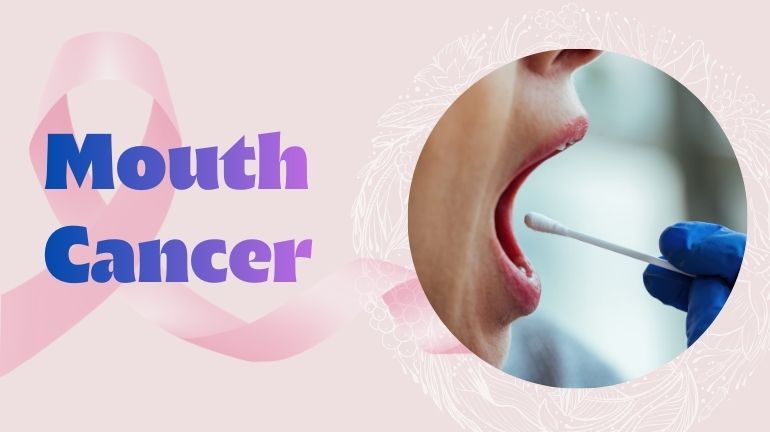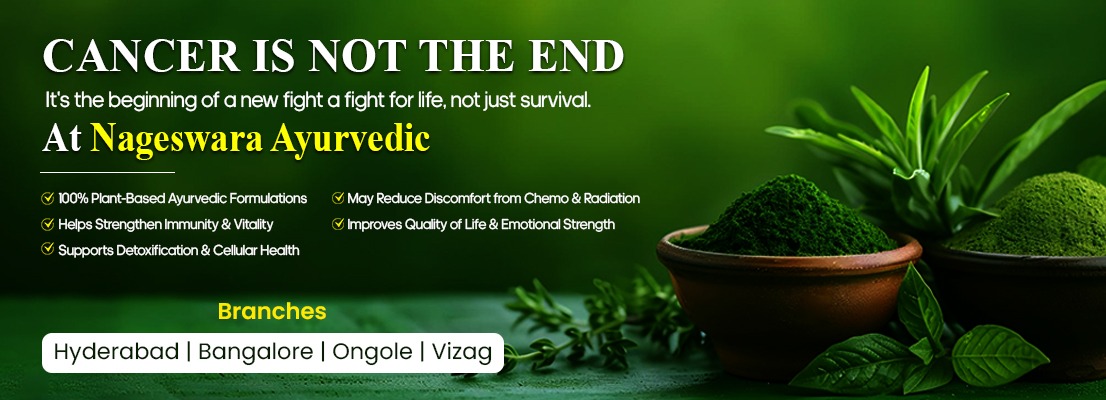
Mouth Cancer
Mouth cancer, also called Oral Cavity Cancer, is a malignant tumor that develops in any part of the oral cavity — including the lips, gums, inner cheeks, tongue, palate, and floor of the mouth. It most often originates from squamous epithelial cells that line the mouth and throat. Prolonged exposure to tobacco, alcohol, poor oral hygiene, or chronic mucosal irritation can initiate cellular mutation leading to cancer.
In Ayurveda, mouth cancer corresponds to Mukhagata Arbuda — a pathological overgrowth arising from Rakta dushti (impure blood), Mamsa dhatu vikriti (degeneration of muscle tissue), and Pitta–Kapha imbalance resulting in ulceration, swelling, and abnormal tissue formation.
Causes of Mouth Cancer
- Tobacco use: Chewing betel nut or smoking (major cause).
- Alcohol consumption: Increases mucosal irritation and cellular mutation.
- HPV infection: Contributes to oropharyngeal cancer.
- Chronic mechanical irritation: Ill-fitting dentures or sharp teeth.
- Poor oral hygiene: Causes bacterial toxins and inflammation.
- Nutritional deficiency: Deficiency of vitamins A, C, and minerals like Zinc.
- Radiation or chemical exposure: Occupational risk factors.
Ayurvedic Causes (Nidana):
- Excess spicy, acidic, or fermented foods (Ushna–Tikshna Ahara).
- Suppressed emotions (Krodha, Shoka).
- Consumption of Viruddhahara (incompatible foods) and Vishadravyas (toxic substances).
- Accumulated Ama and chronic Pitta–Kapha aggravation in Rakta and Mamsa dhatus.
Types of Mouth Cancer
- Squamous Cell Carcinoma: Most common type; affects oral lining.
- Verrucous Carcinoma: Slow-growing and locally invasive.
- Salivary Gland Carcinoma: Arises from minor salivary glands.
- Sarcoma: Affects deeper connective tissues.
- Lymphoma: May involve tonsillar or gingival tissues.
Risk Factors
- Tobacco chewing, betel nut, smoking, and alcohol.
- HPV infection.
- Chronic irritation and poor oral hygiene.
- Vitamin and mineral deficiencies.
- Long-term exposure to Pitta-aggravating foods.
- Genetic predisposition or prior radiation therapy.
Signs & Symptoms
- Persistent ulcer or sore inside the mouth.
- White, red, or mixed patches (leukoplakia or erythroplakia).
- Difficulty in chewing, swallowing, or moving tongue/jaw.
- Unexplained bleeding or foul odor from mouth.
- Swelling, lump, or thickened mucosal area.
- Ear or jaw pain, weight loss, or fatigue.
Complications
- Difficulty in eating, swallowing, or speaking.
- Pain, infection, or bleeding from ulcerated lesions.
- Spread to cervical lymph nodes or other organs.
- Malnutrition, dehydration, and severe fatigue.
- Post-surgical disfigurement or recurrence.
Ayurveda’s Perspective on Mouth Cancer
Ayurveda identifies Mukhagata Arbuda as the oral manifestation of Rakta dushti and Mamsa dhatu kshaya, driven by Pitta–Kapha vitiation.
Nidana (Causative Factors):
- Ushna (hot), Tikshna (spicy), and Amla (sour) foods.
- Tobacco, alcohol, and toxic exposures.
- Improper oral hygiene and chronic infection.
- Stress, anger, and disturbed sleep.
Samprapti (Pathogenesis):
- Agnimandya (weak digestion) → Ama formation.
- Ama + Pitta–Kapha aggravation → Rakta & Mamsa dhatu dushti.
- Local tissue stagnation → Granthi (nodule) → Arbuda (tumor formation).
Dosha Involvement:
- Pitta: Burning, redness, ulceration.
- Kapha: Swelling, heaviness, sluggish healing.
- Vata: Pain, dryness, tissue degeneration, and spread.
Mouth Cancer Treatment at Nageswara Ayurvedic – Role of Zingiber officinale & Curcumin
At Nageswara Ayurvedic, mouth cancer is treated using a holistic Rasayana-based integrative protocol. The key therapeutic agents include Zingiber officinale (Ginger) and Curcumin (Turmeric extract), supported by plant-based Calcium, Phosphorus, and Magnesium to rebuild mucosal integrity and enhance vitality.
Zingiber officinale (Ginger):
- Contains gingerols and shogaols, which exhibit strong anti-inflammatory, antioxidant, and anticancer activity.
- Helps reduce mucosal inflammation, pain, and infection.
- Stimulates microcirculation and enhances digestion, aiding Ama clearance.
- Induces apoptosis in malignant cells and protects healthy mucosa from radiation-induced damage.
Curcumin (Turmeric Extract):
- A potent anticancer Rasayana compound that inhibits tumor proliferation and metastasis.
- Suppresses NF-κB and COX-2 inflammatory pathways.
- Promotes oral wound healing and mucosal regeneration.
- Balances Pitta and Rakta doshas, providing cooling, detoxifying, and restorative effects.
Rasayana Plant-based Minerals:
- Calcium (Cissus Extract 5.0%) – Strengthens jaw and bone structure, supports tissue regeneration.
- Phosphorus (Papaya Leaf Extract 3.0%) – Aids cellular repair and improves healing rate.
- Magnesium (Moringa Leaf Extract 1.0%) – Enhances energy metabolism, reduces stress, and supports muscle relaxation.
Rasayana Herbs for Mouth Cancer Care
- Guduchi (Tinospora cordifolia): Immunomodulator, detoxifies Rakta dhatu.
- Amalaki (Phyllanthus emblica): Antioxidant, vitamin C source for mucosal repair.
- Yashtimadhu (Glycyrrhiza glabra): Soothes ulcers and relieves pain.
- Tulsi (Ocimum sanctum): Anti-inflammatory and adaptogenic.
- Neem (Azadirachta indica): Blood purifier, antimicrobial.
- Bala (Sida cordifolia): Strengthens nerves and improves vitality.
Treatment Relevance at Nageswara Ayurvedic
1. Shamana (Pacification):
Internal medicines: Zingiber officinale, Curcumin, Guduchi, Yashtimadhu, Neem. Topical lepas and mouth rinses to heal ulcers and reduce inflammation.
2. Rasayana (Rejuvenation):
Long-term Rasayana therapy with Ginger + Curcumin + Calcium, Phosphorus, Magnesium for tissue regeneration and immunity. Prevents recurrence and improves post-treatment vitality.
3. Diet & Lifestyle:
Recommended: Fresh fruits, leafy greens, turmeric, moringa, coconut water, soups, and antioxidant juices.
Avoid: Tobacco, alcohol, spicy, fried, or acidic foods.
Lifestyle: Meditation, pranayama (Bhramari, Anulom Vilom), and sound sleep to balance Pitta and stress.
4. Integration with Modern Oncology Care:
Ayurvedic therapy minimizes side effects such as oral mucositis, ulcers, fatigue, and appetite loss.
Enhances chemo-radiation tolerance and accelerates healing.
Improves emotional stability and overall quality of life.
